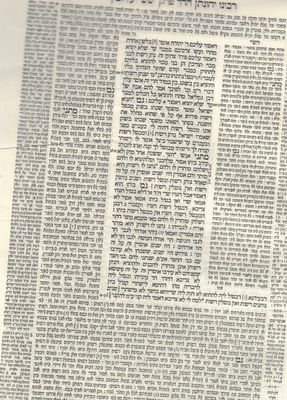
HIDE/SHOW IMAGE
21a
{Eruvin 61b, Mishna, continues}
Rabbi Yehuda said {that Rabban Gamliel's father said it} with another wording: Hurry and perform your requirements in the alleyway before it {=the day} goes out {and thus night falls} and he will restrict you.
To explain, this Tzeduki gave over his domain {in the alleyway} to the {other} members of the alleyway, and those members of the alleyway need to bring out their vessels in order to take possession of the alleyway before the Tzeduki brings his vessels into the alleyway, which would {if he did it first} nullify his gift, as we learn {in the Mishna, Eruvin 69b:} If the person who gave his right carried, whether unintentionally or intentionally, then this one restricts - these are the words of Rabbi Meir, etc...
Therefore, Rabban Gamliel's father said to hurry and bring out all your vessels to the alleyway before he brings out {his vessels} and restricts you.
{Eruvin 69b}
Gemara:
They learnt {in a brayta}: An Israelite mumar {apostate} who nonetheless keeps Shabbat in the marketplace {publicly}, may renounce his right {to the courtyard, unlike a gentile who may not}.
To explain: Even though he desecrates the Shabbat in secret.
And one who does not keep Shabbat in the marketplace may not renounce his right, for he is like a gentile. For we say that an Israelite may give over his right or nullify his right, and as for a gentile, until he rents {to you}.
How is this {presentation or renunciation} done? He says "my share is acquired to you" or "my share is renounced in your favor" and he does not need to perform a formal act of acquisition.
Mishna:
People of a courtyard one of whom forgot and did not make an eruv - his house is forbidden to him and to them to carry in and to carry out, and theirs are permitted to him and to them. If they gave him their right - he is permitted and they are prohibited. If there were two, they restrict one another; for one may give the right and may take the right, two may give the right but they may not take the right.
Gemara:
{Since the Mishna said "his house is forbidden to him and to them to carry in and to carry out":} His house is forbidden, but his courtyard is permitted {to the other tenants}.
How can this be?
If he did not renounce, why is his courtyard permitted? And if he did renounce, why is his house forbidden?
No, this is necessary for the case that he renounced his rights in the courtyard {but not explicitly his house}. And the Sages hold that one who renounces his rights in his courtyard does not {automatically} renounce his rights in his house.
"and theirs are permitted to him and to them":
What is the reason? He is reckoned as their guest.
"If they gave him their right - he is permitted and they are prohibited":
And why? Let them be considered his guests!
One to five {people} is considered a guest. Five to one are not considered guests.
"If there were two, they restrict one another...":
To explain: There were two who forgot and did not make an eruv together with the other members of the courtyard. Even though the members of the courtyard grant them their rights, they {=the two} are not permitted to carry in and to carry out, for since both of them did not make an eruv, each one restricts the other.
This is obvious!
No. It is necessary for the case in which one {of the two} turns around and renounced to his friend. I would have said that he {=the latter} would be permitted. Therefore it informs us that, since at the time he renounced, he {=the former} did not have unrestricted use of the courtyard, he {the latter} is not permitted.
{Eruvin 70a}
["two may give the right but they may not take the right":
For what is this {statement}? It is needed for the case in which they said to him: acquire {our shares} on condition that you transfer them to the other tenant.
]
It's been a while...
-
I've been blogging a bit on Substack, at Scribal Error. While focused more
on gemara and girsaot, I just had a post on Rationalism and Midrash. Check
ou...
3 years ago



No comments:
Post a Comment